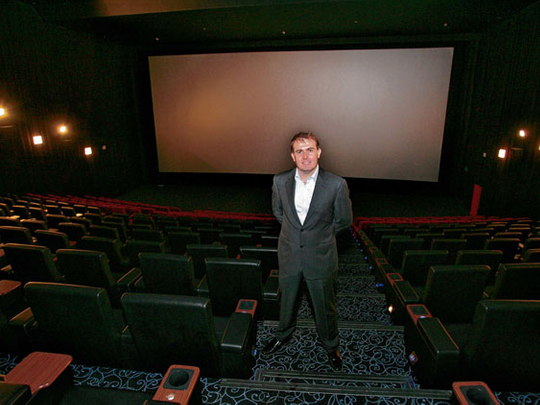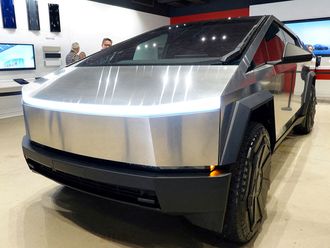
Dubai:
VOX Cinemas, previously CineStar Cinema before it became wholly owned by Majid Al Futtaim Ventures, is planning to triple its screen count across the Middle East within the next five years, a top company official said.
The company is considering markets in Egypt, Kuwait, Bahrain, Qatar and Syria after the political troubles there subside, said Cameron Mitchell, chief executive officer of VOX Cinemas.
It costs over $10 million to fit out a cinema per location, which includes the projectors, seats, counters, carpets and screens, he said. VOX Cinema had announced earlier that they will be expanding with five new cinemas in Lebanon, Oman and Fujairah in 2013.
With 10,000 seats and 50 digital screens across its locations, the cinema shows about 330 films a year. It is now investing to renovate its five existing cinemas in the UAE by the end of 2013, Mitchell said.
Gulf News caught up with him for insights on the future of the cinema-going experience in the region.
Gulf News: What are the new technologies in enhancing the cinema experience? What are you shopping for?
Cameron Mitchell: There’s 4D technologies now in place, whereby not only do you have 3D vision, but also you have scent, enhanced sound, touch, all the senses are involved. You have the seats moving, lights, water, you have spray, all these concepts that are synchronised with the actual film. It’s not a rumble or distraction; it’s integrated into the film with the studio’s approval.
The other one which we’re quite excited about is that there are few new sound formats that are coming out. At the moment Dolby has seven sound channels, the new Dolby Atmos [system] that come out has 120 addressable channels, where you’re sitting in a room totally blacked out screen during a thunderstorm and you actually feel cold. Because they bounce sound all around the room, you’ve got lightning above your head, you’ve got rain that actually feels like you’re in a thunderstorm. Their ability to not only enhance what you’re seeing on screen, but also what you’re hearing is increasing everyday.
This week is interesting talking of technology, it’s the first release of a major widespread film in 48 frames per second, which is the Hobbit.
Q. You are currently building a VOX VIP cinema in Mercato mall. How is the VIP cinema market doing here?
A. What makes it VIP is the standard of the fit-out, what we sell, the seats. The cost is significantly more — the fit out would be, as an estimate, 20 per cent higher than a normal fit out.
Pricing is not fixed at the moment — we have to look at supply and demand and engage the Ministry of Economy to make sure we have approval from them. The range we’re thinking Dhs. 45 to Dhs. 50. We ensure to have traditional seats at Dhs. 35.
In this market, people are happy to pay for convenience and an enhanced experience... When you look across our entire cinema circuit, VIP seats make up 20 to 25 per cent of total seats.
Q. Food is a major part of watching movies at the cinema. What percentage do food sales contribute to your total revenues?
Cinemas would not exist without food. On a ticket price, after we’ve paid municipality fees and over 50 per cent of ticket price to the film distributor. So on Dh35, we pay a municipality fee of Dh3.50 and half for the distributor which leaves about Dhs. 14 to pay for the staff, electricity, rent and lights. Food here is quite cheap compared to other markets.
Q. The queues for some foreign films at DIFF suggests there is considerable interest in independent films in Dubai. Do you see possibilities in dedicating screens specifically for this content year round?
A. We hope so. We try and screen as much content as we possibly can. The UAE is a bit different because we are catering to Arabic, Tagalog, Indian and Hollywood content and releasing up to six films a week. What this means is that the film season is shorter so the average length of screening is two or three weeks. We get comments from our guests saying ‘please keep your films longer.’ Because the UAE is such a diverse population its hard to offer everything for everyone all the time but the trend for cinemas is to build bigger cinemas with more screens which means you can show more content and show it longer. It’s a supply and demand issue… What DIFF does particularly well is that it concentrates everyone’s attention on the content coming for the festival.
Q. Advancements in technology mean people can enjoy a home cinema experience. How do you compete with that and other forms of entertainment?
A. The biggest advantage that cinemas have over our competitors is the release window, so from when we release a film to when it releases on video on demand or DVD is three months. When you go out and have the social experience of seeing it on a screen that’s 20 or 30 times the screen at home with 60 or 70 speakers where someone is serving you, then people will always like the social side of cinema… We also show concerts, gaming and sports events.
Q. What will be the future trends in cinema viewing experiences?
A. The trend in the future is that people will be able to come in with their friends, hire a cinema and say ‘my favourite film is Braveheart I’d like to come watch it on the weekend with my friends for my 40th birthday, I want food and beverages and customized this or that’ …We are investing a lot to make sure we can offer those alternatives.
Q. What are your plans for the company in the next five years?
A. We are managing our expansion plans as we go into neighbouring markets, that’s our number one priority at the moment. We will look at new technology and how our business will need to change. We will look at other forms of revenue that we may need to pursue as cinema market adapts…I think we’re just getting to touch on the food we should be offering in cinemas…The intention is that we expand our menu exponentially subject to being able to offer the same quality that you expect at a restaurant.












